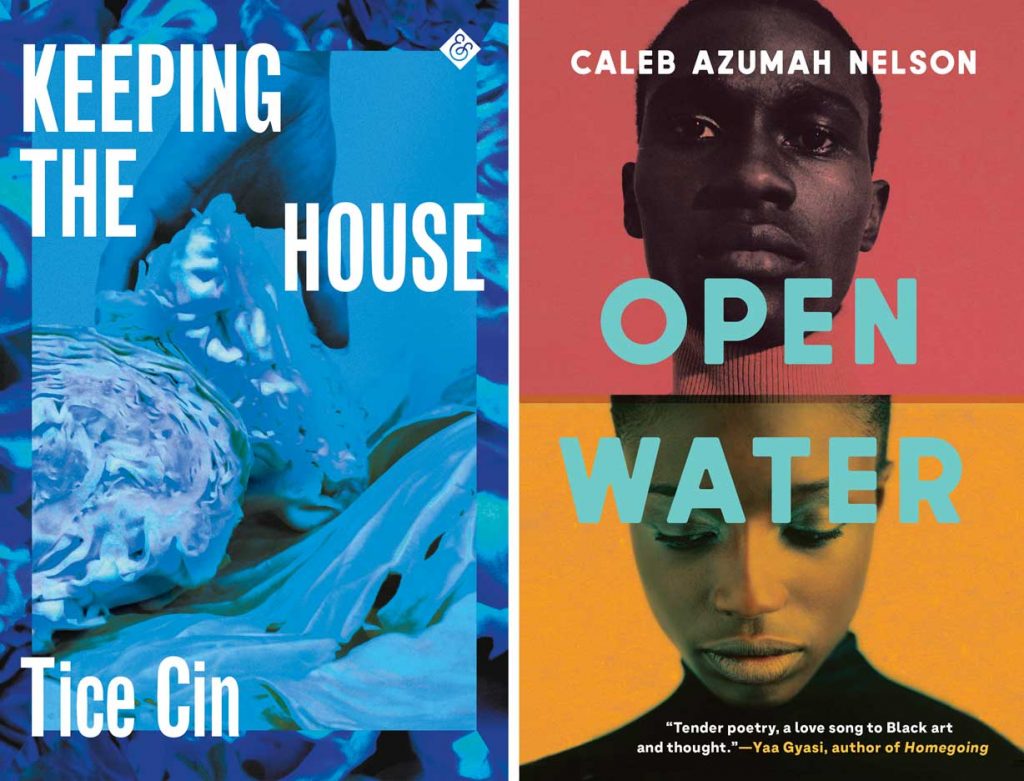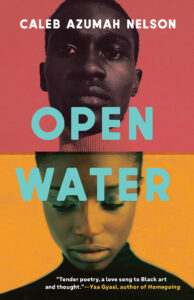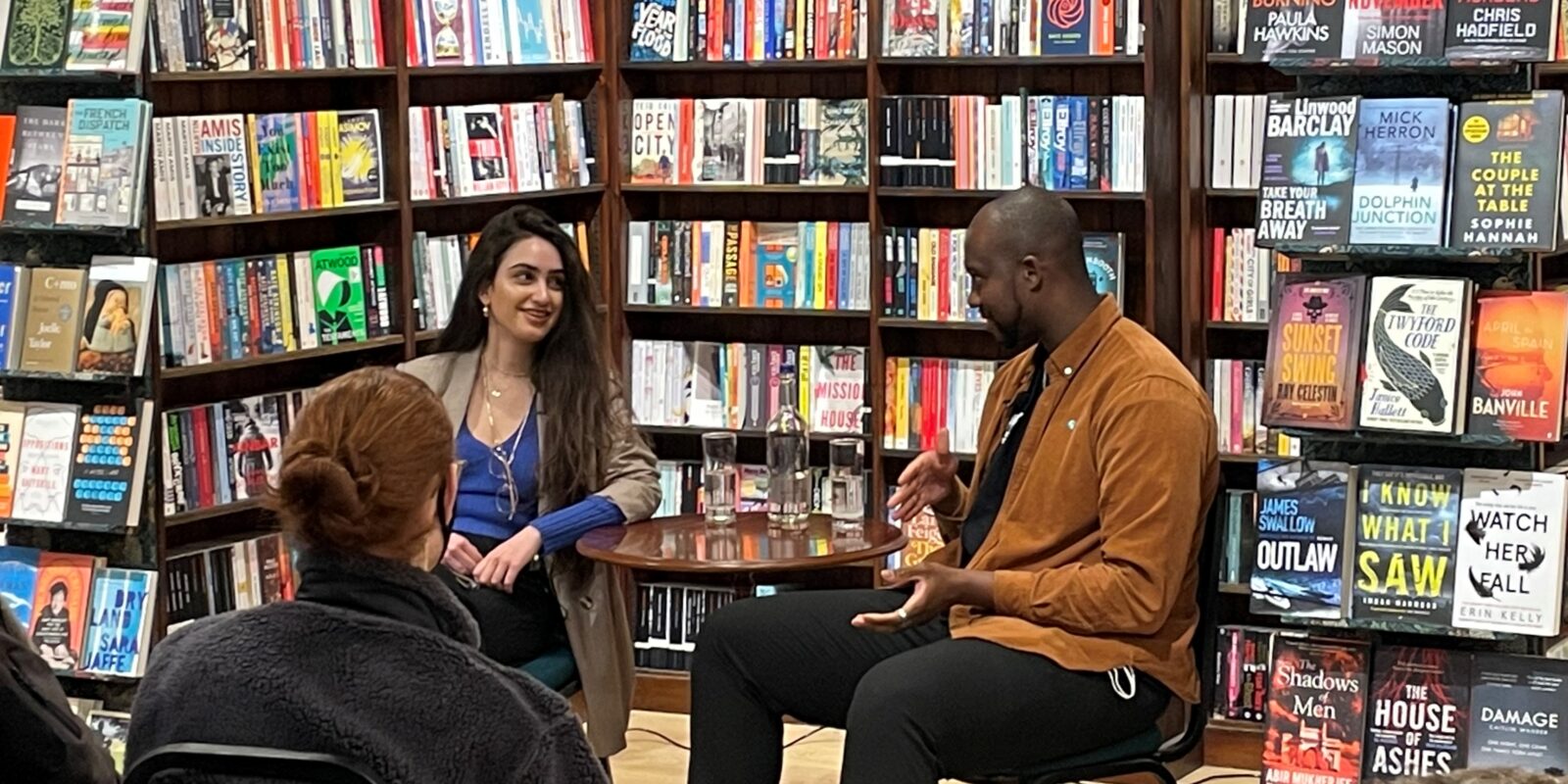Intimacies: On Tice Cin’s Keeping the House and Caleb Azumah Nelson’s Open Water
Eileen Ying
Tice Cin and Caleb Azumah Nelson arrived for a reading at Oxford’s Daunt Books on a characteristically damp February evening. The room fell silent as they took their seats – Cin in blue, Nelson in a coppery brown, the two of them held in gentle focus against the bookstore’s wooden interior. When they spoke, they spoke quietly, searchingly. For an hour, the room remained hushed. The air, flush with their words, felt somehow effervescent.
It was the same feeling you get reading the pair’s debut novels. Though the books differ in premise – Cin’s Keeping the House makes a tender pastiche of Tottenham’s early-noughties heroin trade, while Nelson’s Open Water tracks a romance along the backstreets of present-day London – they share a certain vitality. These are works of love, maps of the city fashioned from the relationships among its inhabitants. In this way, the writers manage to bring a sense of closeness to a sprawling expanse, just as they bring a sense of expansiveness to its most closely-guarded encounters. Cin’s “eroin” operation is no black-suited, blood-soaked chase; it’s light leaking into the local snooker hall, laughter over Turkish coffee, a moment of bliss on the top floor of the bric-à-brac shop, holding hands and watching television after a raid. Soft, beguiling noir. Meanwhile, in Open Water, Nelson’s fated lovers glow violet in the club. The air buzzes.

At Daunt, the conversation kept circling back to the idea of exposure. Cin noted that Open Water introduces its reader to a number of coded spaces. “How do you feel,” she asked Nelson, “knowing that people from outside those communities are seeing those spaces?” He paused, then spoke about the importance of making his people feel seen – a neat reversal of perspectives. He and his narrator are both photographers, after all, and exposure is also a measure of the light that reaches a camera’s film. Behind the viewfinder one accesses a kind of power.
Of course, things are not always so simple. “Careful,” begins Cin’s Keeping the House, “when you turn your eyes towards someone, you allow them the chance to turn theirs on you.” To expose, in other words, is to be exposed, and to be exposed is to be made vulnerable. In Open Water, Nelson’s Black protagonist comes up repeatedly against the brutal glare of law enforcement. In one instance, he is stopped and searched on the way to a party; in another, he passes a dreadlocked boy pressed up against a wall, handcuffed and hedged in by a throng of cops. “Sometimes you forget to be you is to be a Black body,” he says, “and not much else.”
But if the world is relentless in reducing Nelson’s and Cin’s characters to mere matter, the authors offer an ethic of care in response, a form of attention that begins to repair the stripped-down subject. In the bookstore, Cin spoke of “feeling like there’s always another something, a gentle goodness that runs through things.” In her book, she pillows moments of calamity with that unnamable substance: at the same time a character is revealed to be an addict, there’s a fresh plate of börek being placed on the table. Open Water bears a similar doubleness. James Brown’s scream, in one scene a sound of horror, of a young Black man knocked violently into the road, is in another a sign of life – something full and vital and “waiting to emerge.”
What Cin and Nelson capture so well are the things that exist beyond language – the rhythm, the breath, the tone, the hue. Their stories are patient and recursive. “We circle over the same territory,” Cin writes. “It makes you notice the chip on the surface that you nearly missed.” For these writers, London is home, and home is a place we find in loops.
Photograph at top: Tice Cin and Caleb Azumah Nelson in conversation at Daunt Books, 2022. By Elleke Boehmer.

Tice Cin is an interdisciplinary artist, poet, and producer from North London. An alumnus of Barbican Young Poets, she now creates digital art as part of Design Yourself, a collective based at the Barbican. She also serves as Community Manager at Tilted Axis Press. Cin’s work has been awarded the 2019 London Writers Award and longlisted for the 2022 Dylan Thomas Prize. Keeping the House is her debut novel.

Caleb Azumah Nelson is a British-Ghanian writer and photographer living in Southeast London. His writing has been published in Litro and The White Review. Nelson’s story “Pray” was shortlisted for the BBC National Short Story Award in 2020, and his photography won the Palm People’s Choice Prize in 2019. His first novel, Open Water, has been awarded a Costa Book Award.
Open Water in Cape Town
Elleke Boehmer

In March 2022 it was my great pleasure to read pages from Caleb Azumah Nelson’s Open Water with students at the University of Cape Town, in a class on narrative and intervention. We focussed on the sections in which the narrator welcomes in the summer in London with a series of refrain-like sentences that begin a number of paragraphs: “It’s summer now …”. These repeat moments are followed by lines like, “You want to write. You want to meet strangers for dinner, and not refuse another drink at another bar” (p. 69). Without prompting, the students responded especially to the poetry of the writing, to the striking rhythms, and how they encouraged identification, the ways in which the words centred them in the narrator’s experience. And this then sparked them to pick up on other things, like on the enticement of meeting strangers for a meal, rather than just friends, and on the process of falling ever so gently and subtly in love. They spoke about bass drums and about immersion. I felt overjoyed to have been able to introduce this talented and attentive London writer into the classroom in Cape Town.
Cite this: Ying, Eileen. “Intimacies: On Tice Cin’s Keeping the House and Caleb Azumah Nelson’s Open Water.” Postcolonial Writers Make Worlds, 2022, https://writersmakeworlds.com/essay-intimacies-cin-nelson. Accessed 6 April 2022.
